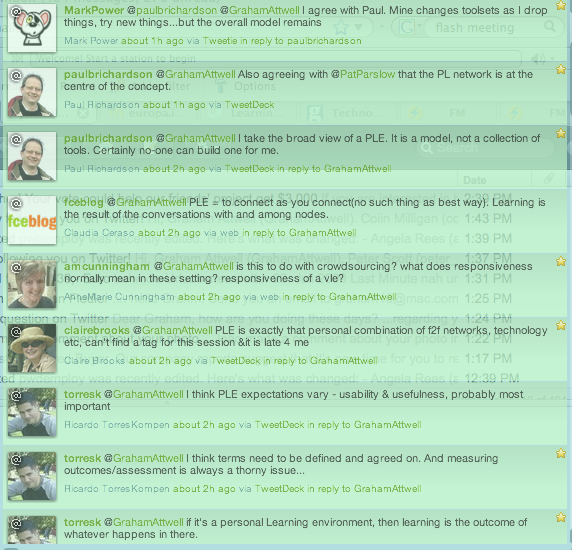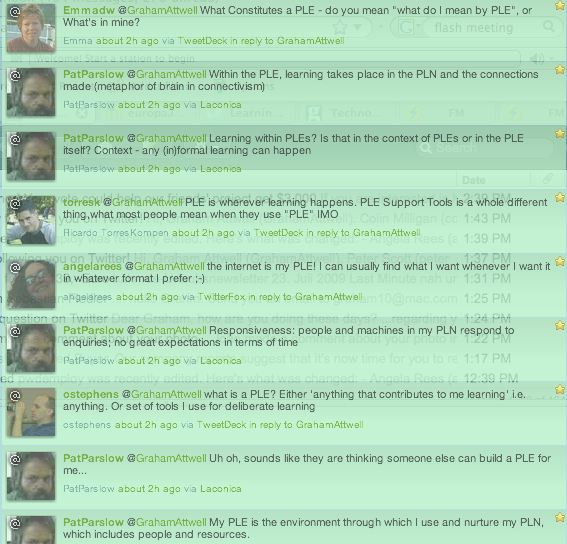I have a 18 year old intern student, Jo Turner-Attwell, working for me. When I was in Vienna at the ECER conference, I left her the task of looking at Vygotky’s work in relation to Personal Learning Environments. This is part of the research we are undertaking in the Mature-ip project. And here is her summary. Pretty good start I think!
“Vygotsky died in 1934, almost a century ago, however his theories are becoming more relevant than they ever were during the course of his live. In particular the Zone of Proximal Development and the theories developed from this idea are more important than ever before. In addition to this his strong themes of the importance of social interaction and learning with assistance are being more closely looked at.
The zone of proximal development is the area between what an individual can achieve on their own and what they can achieve with assistance. Vigotsky’s definition is ‘the distance between the actual developmental level as determined by independent problem solving and the level of potential development as determined through problem solving under adult guidance, or in collaboration with more capable peers’. It is easy to understand through the idea of school text books. Those that are not too hard and not too easy, so challenging whilst not being beyond a students capabilities, are the optimal level of difficulty and right in the zone of proximal development. Vygotsky believed that learning shouldn’t follow development, but rather should lead it. A student should constantly be reaching slightly beyond their capabilities rather than working within them.
The method of scaffolding has been developed from Vgotsky’s theories. This is the concept that teachers or trainers, should simply assist their student until they are ready to act alone. A good example of this is a bike, moving from stabilisers, to someone running behind, to riding alone. This overlaps with the concept of a zone of proximal development, where some forms of scaffolding work for some people and not for others. Zones of proximal development vary and often different types of scaffolding are needed to reach the same goal. Vygotsky’s theories suggest students should lead their learning and teachers simply assist and rather than judging students on what they know in standardised tests, learning should be done through looking closely at their zone of proximal development. This allows learning to be developed around the needs of the learner, rather than learners trying to fit their needs into current standardised curriculums. This is particularly important as the current examination system can fail to support students who struggle in examination conditions, or excel in the practical side of learning.
This links in well with the concept of Personal Learning Environments or PLEs. The idea that the student themselves creates a virtual space to manage their own learning, whilst allowing room for social networking as a support system. This could combine the informal areas of learning with a more academic e-portfolio type system. This in theory is a fantastic idea, particularly in the way of social networking, which I do think it is important teachers begin to recognise more as a good teaching support method. However I do believe that this would have to be specific to formal learning. Types of informal learning would continue on separate social networking sites where students could interact privately among themselves. During my A Level studies it was not uncommon for teachers to assist their students through current informal online social networking systems as teachers began to take on a more friend-like role. However for my 14 year old sister this sort of student teacher relationship would be unthinkable. Not because I feel it would be inappropriate but more because I know that she would see it as an invasion of her privacy. This need for privacy in addition to support I believe would also exist within employer and employee relationships. This can clearly be seen from current issues of employers judging people’s employability on their facebook sites. I know I personally present myself differently upon my facebook site to the way I like to be seen in my work environment, but still feel I benefit from areas where I can communicate with my employer online, currently I use skype. Therefore I believe there is the need to keep formal learning environments and informal learning environments apart. Limiting the room for PLEs to grow.
A more significant problem I had was how one standardised PLE system could be used to support different types of students, particularly those who were better with practical studies. If the idea of a Personal Learning Environment was that an individual invented it, then how could teachers assist with the development of this? How could it be standardised? Also surely teaching this would turn it into formal education and would students still see it as their own space, and could teachers cope with only having access to certain areas? How could student that need more help receive that help through a similar model to a student that needed less?
However this is only one area where I feel that Vgotsky’s theories are relevant. I believe that judging students on their zone of proximal development and their potential for learning could allow students that struggle under exam pressure and to work within time limits to receive the grades they deserve. I know many students far smarter than myself who when put in an exam situation struggled and received lower grades than me. My mind being better suited to the remembering of large amounts of data, rather than me necessarily understanding the work better. When first asked the question of how we could measure this I drew a blank. But in fact part of Vygotsky’s theories is less capable students being shown things by more capable students, therefore why couldn’t students understanding be measured on their ability to convey the information they have learnt, maybe even after being shown how by a more able other. Allowing a student to reach the top of their Zone Of Proximal development. In my own admission this also has its flaws in that some of the most intelligent people struggle with teaching and I’m no educational expert so do not have the answers to these flaws. However this did lead me towards ideas of widening the way people are assessed, meaning ongoing assessment of a students progress and a students ability teach could simply make up parts of achieving a grade along with traditional examinations and coursework. If informal learning is as important as formal learning varying the way students are assessed can only work in their favour. However this does again lead into difficulties, as with anything, in that students may receive closer grades, and it may be difficult to differentiate from students who previously would have been placed in very different catorgories.
Also at the root of many of the differentiation of students who may excel in informal learning but not in formal is the subjects that are classified as worth studying. What is worth learning? I found this question upon one of the sites on which Vygotsky’s work was studied and it made me think. School curriculums are so very narrow in comparison with the potential in university courses where the opportunities of what to study are endless. Technology in particular I feel is under represented. When I first came to Pontydysgu I had no idea what a learning platform or PLE were and couldn’t work many of the standard systems on a Mac. These technological systems seen at the forefront of education are barely heard about within education systems. In a technological age I cannot help but wonder why this sort of important knowledge is not being taught, why students aren’t studying the more complex area of technology. We use technology everyday, probably know more than many of our teachers, yet it is not part of any standardised curriculums, it is all informal. I had to quickly learn how to edit audio and video, work a spreadsheet, funnily enough mainly through scaffolding techniques. Audio and video in particular is the kind of technology that only my peers who learnt informally would be able to do. This is most likely because of the lack of knowledge of teachers, not as a criticism of them but rather an emphasis on the fact that the technology we use so often today has mostly come about since many of them finished learning. This to me suggests the need for some sort of lifelong learning system, which again the PLE can support. Although the problems of standardising appear again, there is clearly a need for the general population to have a way to keep up to date with fast changing technologies as technology is moving on before it has the opportunity to be properly implemented. Even in my sixthform a student himself bought in a wireless rooter due to the lack of one, so that students could use their laptops and access the school network. Although moving a long way from Vgotsky the roots in his theories can still be seen in that social interaction is needed for this sort of technology to be fully accessible to everyone. Different people will need different methods to help them grasp these sort of technological systems, particularly as I believe teachers would struggle as much as, if not more, than students.”

